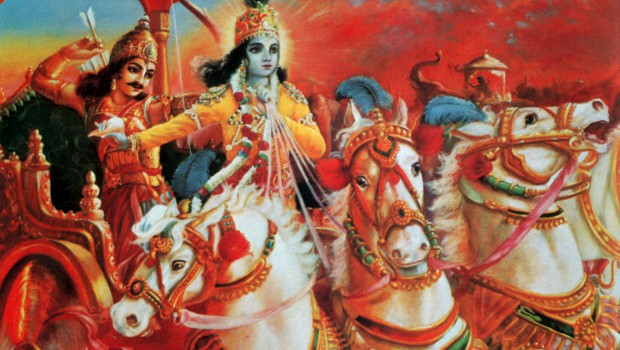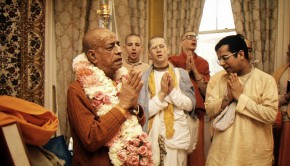What Is the Bhagavad-gita?
The Bhagavad Gita is the divine conversation between a man named Arjuna and God himself in the human form, Lord Krishna. The conversation took place in the middle of the battleground 5137 years ago just before the start of a great war in Kurushastra, India.
Spiritual realization and not war is the subject matter of the Bhagavad Gita. It should be understood that it was circumstances that led to the Bhagavad Gita being spoken on the battle ground and the war was not the reason for it’s revelation.
The Bhagavad Gita is the word of God, as it was spoken by God himself and not a self declared son of God or prophet. The Bhagavad Gita was spoken by Lord Krishna, 3100 years before Jesus and 3700 years before Muhammad. It is the only known scriptures spoken by God in person. Hinduism is the only religion based on following a God who has been actually seen by millions. All other religions are based on believing in a God who has never been seen. The Bhagavad Gita gives exact information regarding God, the soul, material nature, birth, death and life after death. No other religious scripture provides this information.
1. Who is Krishna?
| Krishna is the human incarnation of the Almighty God. Millions of people actually witnessed the glory of God in person, with their own eyes. Lord Krishna revealed himself as the origin of everything.
“The whole cosmic order is under Me. Under My will it is automatically manifested again and again, and under My will it is annihilated at the end.” Lord Krishna (Bg. 9.8) “All opulent, beautiful, and glorious creations spring from a spark of my splendor.” Lord Krishna |
To protect innocent people from imposters, Arjuna asked Krishna to prove his divinity by exhibiting his universal form, a form that anyone who claims to be God should be prepared to show. Lord Krishna then proves his divinity by revealing his universal form to Arjuna. Arjuna sees the brilliant, glaring unlimited universal manifestations of Lord Krishna. Who reveals in one place, everything that ever was or now is or will be.
2. Lord Krishna is God
“Those who are devotees of other gods and who worship them with faith actually worship only Me, but they do so in a wrong way.” Lord Krishna (Bg. 9.23)
“Abandon all varieties of religion and just surrender unto Me. I shall deliver you from all sinful reactions. Do not fear.” Lord Krishna (Bg. 18.66)
3. What does Lord Krishna preach to Arjuna and Mankind?
In a clear way, Lord Krishna describes:
- The science of self-realization.
- The exact process by which a human being can establish their eternal relationship with God.
- The purpose and goal of human existence.
- The eternal principles which are essential for spiritual life.
- Material nature.
- Life on higher and lower planets.
- How to attain life on higher planets
- How to be free from the cycle of birth, death and re-birth, Moksha.
“That very ancient science of the relationship with the Supreme is today told by me to you because you are my devotee as well as my friend and can therefore understand the transcendental mystery of this science.” Lord Krishna to Arjuna (Bg. 4.3)
4. Creation
“In the beginning of creation, the Lord of all creatures sent forth generations of men and demigods, along with sacrifices for Vishnu, and blessed them by saying, “Be thou happy by this yajna [sacrifice] because its performance will bestow upon you everything desirable for living happily and achieving liberation.” (Bg. 3.10)
5. Materialism carries away the intelligence of a person
Modern lifestyles (partying, sexual lust, lust for material objects, greed, ego, desires, relationships), western culture and bollywood culture (copying the west), western pop music and Indian pop music (copy of western music) turns a person of intelligence into a person of ignorance. Materialism slowly and unknowingly drains away the intelligence of a person.
“As a strong wind sweeps away a boat on the water, even one of the roaming senses on which the mind focuses can carry away a man’s intelligence.” (Bg. 2.67)
“While contemplating the objects of the senses, a person develops attachment for them, and from such attachment lust develops, and from lust anger arises. From anger, complete delusion arises, and from delusion bewilderment of memory. When memory is bewildered, intelligence is lost, and when intelligence is lost one falls down again into the material pool.” (Bg. 2.62-63)
6. What causes one to engage in sinful acts?
It is lust, which induces one to sinful acts. Lust bewilders and entangles one in the material world. Lust presents itself in the senses, mind and intelligence. Self-control and Yoga practice can counteract lust.
“Arjuna said: by what is one impelled to sinful acts, even unwillingly, as if engaged by force? Lord Krishna said: It is lust only, Arjuna, which is born of contact with the material mode of passion and later transformed into wrath, and which is the all-devouring sinful enemy of this world.” (Bg. 3.36-37)
7. Life on other Planets originate from Earth
“The seven great sages and before them the four other great sages and the Manus [progenitors of mankind] come from Me, born from My mind, and all the living beings populating the various planets descend from them.” (Bg. 10.6)
8. God does take forms
| Left, a sampling of Lord Krishna’s infinite manifestations, both in the spiritual and material worlds. Outer circle (clockwise beginning from the upper left-hand corner): Indra carrying the thundrebolt, the Himalayas, Lord Siva with the Ganges River in his hair, the moon, the horse Ucchaihsrava, the transcendental om, Kapila, Rama, flower-bearing Spring, Kamadhuk, Arjuna, Vyasadeva, Prahlada, the shark, Vasuki, Skanda, Varuna, Yamaraja, the lion, Kuvera, Agni and Airavata. Inner circle, clockwise (beginning from four-headed Lord Brahma sitting on the lotus flower): Brahma, Narada, Garuda, the sun, the ocean, Lord Visnu. |
“Fools deride Me when I descend in the human form. They do not know My transcendental nature as the Supreme Lord of all that be.” Lord Krishna (Bg. 9.11)
9. The Lord Appears in Every Millennium
“Although I am unborn and my transcendental body never deteriorates, and although I am the Lord of all living entities, I still appear in every millennium in my original transcendental form.” Lord Krishna (4.6).
|
|
Lord Krishna’s Incarnations
|
10. Why Does the Lord Appear?
“Whenever and wherever there is a decline in religious practice, O descendant of Bharata, and a predominant rise of irreligion-at that time I descend myself. To deliver the pious and to annihilate the miscreants, as well as to reestablish the principles of religion, I myself appear, millennium after millennium.” Lord Krishna (4.7-8)
Lord Krishna appeared 5000 years ago for two reasons, firstly to destroy the ignorant people of that time to uphold righteousness and truth, and to teach the science of God, the Bhagavad Gita to Arjuna and mankind.
Even before the war started, Lord Krishna told Arjuna that apart from him and his four brothers, all the soldiers on both sides would be killed. Arjuna was merely an instrument used by the Lord to destroy the ignorant men.
11. Who are we?
We are not the physical body but the soul. The soul is present in the heart of every living being. The soul is 1/10,000th of the upper point of a single hair. Although so minute the soul is so powerful that it animates the entire body with consciousness. It is situated in the heart and when it leaves the body, the heart stops beating, as a result the blood stops circulating and the entire body disintegrates. There are 8.4 million different forms of bodies, the individual soul can reside in. Unlike the physical body, the soul can never be destroyed.
“For the soul there is neither birth nor death at any time. He has not come into being, does not come into being, and will not come into being. He is unborn, eternal, ever existing and primeval. He is not slain when the body is slain.” (Bg. 2.20)
12. There is life after death
| “Never was there a time when I did not exist, nor you, nor all these kings; nor in the future shall any of us cease to be. As the embodied soul continuously passes, in the body from childhood to youth to old age, the soul similarly passes into another body at death. A sober person is not bewildered by such a change.” Lord Krishna (Bg. 2.12-13)
“As a person puts on new garments, giving up old ones, the soul similarly accepts new material bodies, giving up the old and useless ones.” (Bg. 2.22) “One who has taken his birth is sure to die, and after death one is sure to take birth again. Therefore, in the unavoidable discharge of your duty, you should not lament.” (Bg. 2.27) |
13. What is Yoga?
| “Perform your duty equipoised, abandoning all attachment to success or failure. Such equanimity is called yoga.” Lord Krishna (Bg. 2.48)
One should Practice Yoga to Attain the Supreme “To practice yoga, one should go to a secluded place and should lay kuça grass on the ground and then cover it with a soft cloth. The seat should be neither too high nor too low and should be situated in a sacred place. The yogi should then sit on it very firmly and practice yoga to purify the heart by controlling his mind, senses and activities and fixing the mind on one point.” (Bg. 6.11-12) “One should hold one’s body, neck and head erect in a straight line and stare steadily at the tip of the nose. Thus, with an unagitated, subdued mind, devoid of fear, completely free from sex life, one should meditate upon Me within the heart and make Me the ultimate goal of life.” (Bg. 6.13-14) |
14. What will we be in our next life?
The Result of Devotional service to Lord Krishna, offering charity, eating meat and lust.
| Top section: On the left, a man is praying to the deities of Lord Krishna. The result of such devotional consciousness is shown on the right, where he is dancing with Krishna as a playmate in the Lord’s spiritual abode.
Second section: On the left a man is offering charity; on the right he has taken the body of a demigod and is enjoying heavenly delights. Third section: A man is eating meat and other abominable foods; in his next life he is seen in the body of a hog who eats anything and everything. Bottom section: A man is approaching a women with lust. This bestial consciousness will carry him to a dog’s body in his next incarnation. |
“Whatever state of being one remembers when he quits his body, that state he will attain without fail.” (Bg. 8.6)
“One who, at the time of death, fixes his life air between the eyebrows and, by the strength of yoga, with an undeviating mind, engages himself in remembering the Supreme Lord in full devotion, will certainly attain to the Supreme Personality of Godhead.” (Bg. 8.10)
“After being situated in this yoga practice and vibrating the sacred syllable aum, the supreme combination of letters, if one thinks of the Supreme Personality of Godhead and quits his body, he will certainly reach the spiritual planets.” (Bg. 8.13)
“When one dies in the mode of goodness, he attains to the pure higher planets of the great sages. When one dies in the mode of passion, he takes birth among those engaged in fruitive activities; and when one dies in the mode of ignorance, he takes birth in the animal kingdom.” (Bg. 14.14-15)
“Those situated in the mode of goodness gradually go upward to the higher planets; those in the mode of passion live on the earthly planets; and those in the abominable mode of ignorance go down to the hellish worlds.” (Bg. 14.18)
“The living entity in the material world carries his different conceptions of life from one body to another as the air carries aromas. Thus he takes one kind of body and again quits it to take another.” (Bg. 15.8)
15. Life on Material Planets
“From the highest planet in the material world down to the lowest, all are places of misery wherein repeated birth and death take place. But one who attains to My abode, O son of Kunté, never takes birth again.” Lord Krishna (Bg. 8.16)
16. The Mind can be the greatest enemy or the best friend
“One must deliver himself with the help of his mind, and not degrade himself. The mind is the friend of the conditioned soul, and his enemy as well. For him who has conquered the mind, the mind is the best of friends; but for one who has failed to do so, his mind will remain the greatest enemy.” (Bg. 6.5-6)
17. Establishing Intelligence
“For one thus satisfied in Krishna consciousness, the threefold miseries of material existence exist no longer; in such satisfied consciousness, one’s intelligence is soon well established. One who is not connected with the Supreme in Krishna consciousness can have neither transcendental intelligence nor a steady mind, without which there is no possibility of peace. And how can there be any happiness without peace?” (Bg. 2.65-66)
18. Being happy in this life
“Before giving up this present body, if one is able to tolerate the urges of the material senses and check the force of desire and anger, he is well situated and is happy in this world.” (Bg. 5.23)
19. Every being is equal
A Krishna conscious person does not make any distinction between species, man and animal. Lord Krishna is present within the heart of every heart as the Supersoul and thus there is no distinction between differing bodies. All beings are equal.
“The humble sages, by virtue of true knowledge, see with equal vision a learned and gentle Brahman, a cow, an elephant, a dog and a dog-eater.” (Bg. 5.18)
“I envy no one, nor am I partial to anyone. I am equal to all. But whoever renders service unto Me in devotion is a friend, is in Me, and I am also a friend to him.” (Bg. 9.23)
20. God is present in every living being
“I am the Supersoul, seated in the hearts of all living entities. I am the beginning, the middle and the end of all beings.” Lord Krishna (Bg. 10.20)
21. What is real knowledge?
“Humility; pridelessness; nonviolence; tolerance; simplicity; approaching a bona fide spiritual master; cleanliness; steadiness; self-control; renunciation of the objects of sense gratification; absence of false ego; the perception of the evil of birth, death, old age and disease; detachment; freedom from entanglement with children, wife, home and the rest; even-mindedness amid pleasant and unpleasant events; constant and unalloyed devotion to Me; aspiring to live in a solitary place; detachment from the general mass of people; accepting the importance of self-realization; and philosophical search for the Absolute Truth-all these I declare to be knowledge, and besides this whatever there may be is ignorance.” (Bg. 13.8-12)
22. Who is a miser?
Those who think only of themselves, those who enjoy while aware of those who cannot, those who are greedy, those who have no consideration for others and those who do not share are misers.
“Those who want to enjoy the fruits of their work are misers.” (Bg. 2.49)
23. A person of steady mind
“One who is not disturbed in mind even amidst the threefold miseries or elated when there is happiness, and who is free from attachment, fear and anger, is called a sage of steady mind.” (Bg. 2.56)
24. A person in a state of perfect knowledge
“In the material world, one who is unaffected by whatever good or evil he may obtain, neither praising it nor despising it, is firmly fixed in perfect knowledge.” (Bg. 2.57)
25. A person in a state of perfect consciousness
“One who is able to withdraw his senses from sense objects, as the tortoise draws its limbs within the shell, is firmly fixed in perfect consciousness.” (Bg. 2.58)
26. A person of steady intelligence
“One who restrains his senses, keeping them under full control, and fixes his consciousness upon Me, is known as a man of steady intelligence.” (Bg. 2.61)
“Therefore, O mighty-armed, one whose senses are restrained from their objects is certainly of steady intelligence.” (Bg. 2.68)
27. Achieving peace with the self
“A person who is not disturbed by the incessant flow of desires-that enter like rivers into the ocean, which is ever being filled but is always still-can alone achieve peace, and not the man who strives to satisfy such desires. A person who has given up all desires for sense gratification, who lives free from desires, who has given up all sense of proprietorship and is devoid of false ego-he alone can attain real peace.” (Bg. 2.70-71)
28. Those who will be liberated from material existence soon
“Those who are free from anger and all material desires, who are self-realized, self-disciplined and constantly endeavoring for perfection, are assured of liberation in the Supreme in the very near future.” (Bg. 5.26)
29. What is the Kingdom of God like?
The kingdom of Lord Krishna is a place without anxiety. It lies far beyond the material planets. It is eternal, full of countless spiritual planets where Krishna’s Visnu expansions reside. The kingdom is called Vaikuntha. A planet shaped like a lotus flower, stands in the midst of Vaikuntha. There, the trees fulfill all desires, palaces are made of touchstones, and cows supply unlimited milk. Lord Krishna enjoys life there with his loving devotees. Those who reach the supreme abode of Lord Krishna, never return to the material planets.
“That supreme abode of Mine is not illumined by the sun or moon, nor by fire or electricity. Those who reach it never return to this material world.” (Bg. 15.6)
“That which the Vedäntists describe as unmanifest and infallible, that which is known as the supreme destination, that place from which, having attained it, one never returns-that is My supreme abode.” Lord Krishna (Bg. 8.21)
30. How does one attain salvation?
“One can understand me as I am, as the supreme personality of Godhead, only by devotional service. And when, by such devotion, one is fully conscious of me, one can enter into the kingdom of God.” Lord Krishna (Bg. 18.55)
“Whoever, at the end of life, quits his body remembering me alone at once attains my nature without a doubt.” Lord Krishna
31. Surrender the result of all activities to Lord Krishna
“One who performs his duty without attachment, surrendering the results unto the Supreme Lord, is unaffected by sinful action, as the lotus leaf is untouched by water. The yogis, abandoning attachment, act with body, mind, intelligence and even with the senses, only for the purpose of purification. The steadily devoted soul attains unadulterated peace because he offers the result of all activities to me; whereas a person who is not in union with the Divine, who is greedy for the fruits of his labor, becomes entangled. ” Lord Krishna (5.10-12)
32. Engage in Yoga
Engage in Buddhi Yoga – Work (Actions) without attachment to the results. Offer the results of all work to Lord Krishna. By working without attachment, one attains the Supreme. Play for enjoyment, not to win or lose.
Engage in Karma Yoga – Actions in Krishna consciousness. One who works in devotion, with the mind and senses controlled, is in divine consciousness. Although the senses are engaged with sense objects, one is aloof from them if engaged in Krishna consciousness, situated in peace and happiness.
Engage in Dhyana Yoga – Work (Actions) without a desire for reward. Give, but do not expect anything in return. Offer your services with love and generosity, without expecting a reward. Give, but do not take.
33. Famous people should set a good example
“Whatever action a great man performs, common men follow. And whatever standards he sets by exemplary acts, all the world pursues.” (Bg. 3.21)
34. Cycles of Creation and Desolation
Brahmaloka is the highest planet in the material universe, the living entities there are called the Brahma.
One day on the planet of Brahma (Brahmaloka) is 1000 cycles of four ages (yugas) on the planet Earth.
Satya Yuga: The age of the truth and true religion. The yuga (age) lasts 1.728 million years. The humans in this age live up to 100,000 years.
Treta Yuga: The introduction of ignorance takes place in this age. The yuga (age) lasts 1.296 million years. The humans in this age live up to 10,000 years.
Dvapara Yuga: Increased decline in the truth and religious values takes effect in this age. The yuga lasts 864,000 years. The humans in this age live up to 1000 years.
Kali Yuga: The age of irreligion (following false religions) and ignorance. The truth is being virtually non-existent. The yuga lasts 432,000 years. The humans in this age live up to 100 years.
Thus, one single day (12 hours) on the planet of Brahma is:
1000*(1,728,000+1,296,000+864,000+432,000)=1000*(4,320,000)=4320,000,000 human years
The night is also of the same duration. A Brahma lives up to a 100 years. The life of Brahma is truly fantastic by comparison to the life of humans on Earth.
“By human calculation, a thousand ages taken together form the duration of Brahma’s one day. Any such also is the duration of the night. At the Beginning of Brahma’s day, all living entities become manifest from the unmanifest state, and thereafter, when the night falls, they are merged into the unmanifest again. Again and again, when Brahma’s day arrives, all living entities come into being, and when with the arrival of Brahma’s night hey are helplessly annihilated.” Lord Krishna, Bhagavad Gita 8.17-19
35. This is the age of Kali Yuga
We are 5000 years into the age of Kali yuga, we still have 427,000 years to go, before Lord Krishna incarnates himself as Lord Kalki and destroys all the material planets. The Kali yuga is the age of darkness, irreligion (spread of false religions) and ignorance. No one can argue with this. The whole world is full of violence and truth being virtually non-existent. Greed, lust, anger, materialism and violence have covered the minds of most people.
“In this age of quarrel and hypocrisy the only means of deliverance is chanting the holy name of Lord Krishna, there is no other way. There is no other way. There is no other way.”
36. God helps from within
Devotees engaged in pure devotional service to Lord Krishna, even if lacking education or knowledge of the vedic principles, are helped from within by Lord Krishna, who is present in the heart of all living beings as the super soul. Lord Krishna personally destroys the darkness born of ignorance.
37. The Three Modes of Nature
One is in one of three modes of nature, goodness, passion and ignorance. These modes compete in exerting their influence upon us. By understanding that the three modes are active and not we. By realizing that we are separate from the modes of nature. In this way, the influence of material nature gradually diminishes from us.
“Material nature consists of three modes-goodness, passion and ignorance. When the eternal living entity comes in contact with nature, O mighty-armed Arjuna, he becomes conditioned by these modes.” Lord Krishna to Arjuna (Bg. 14.5)
The Mode of Goodness
– A person in the mode of goodness is free from all sinful reactions and is in a condition of happiness and knowledge. One who dies in the mode of goodness attains the higher planets.
“O sinless one, the mode of goodness, being purer than the others, is illuminating, and it frees one from all sinful reactions. Those situated in that mode become conditioned by a sense of happiness and knowledge.” Lord Krishna to Arjuna (Bg. 14.6)
“Charity given out of duty, without expectation of return, at the proper time and place, and to a worthy person is considered to be in the mode of goodness.” (Bg. 17.20)
Simple Food is dear to those in the mode of Goodness
“Foods dear to those in the mode of goodness increase the duration of life, purify one’s existence and give strength, health, happiness and satisfaction. Such foods are juicy, fatty, wholesome, and pleasing to the heart.” (Bg. 17.8)
The Mode of Passion
– A person in the mode of passion is plagued by unlimited desires for material enjoyment, greed and lust (especially sexual pleasures). To satisfy these desires, one is always forced to engage in hard work that binds the person to sinful reactions, resulting in misery. A person in this mode is never satisfied with the position already acquired. One, who dies in the mode of passion, takes birth again on Earth among persons engaged in material desires, greed and lust.
“The mode of passion is born of unlimited desires and longings, O son of Kunté, and because of this the embodied living entity is bound to material fruitive actions.” Lord Krishna to Arjuna (Bg. 14.7)
“Charity performed with the expectation of some return, or with a desire for fruitive results, or in a grudging mood, is said to be charity in the mode of passion.” (Bg. 17.21)
Hot and salty food is dear to those in the mode of Passion
“Foods that are too bitter, too sour, salty, hot, pungent, dry and burning are dear to those in the mode of passion. Such foods cause distress, misery and disease.” (Bg. 17.8)
The Mode of Ignorance
– A person in the mode of ignorance is in a delusion. It fosters laziness, foolishness and madness. One who dies in the mode of ignorance takes birth in the animal kingdom or on the hellish planets.
“O son of Bharata, know that the mode of darkness, born of ignorance, is the delusion of all embodied living entities. The results of this mode are madness, indolence and sleep, which bind the conditioned soul. ” Lord Krishna to Arjuna (Bg. 14.8)
Processed and Frozen food is dear to those in the mode of Darkness
“Food prepared more than three hours before being eaten, food that is tasteless, decomposed and putrid, and food consisting of remnants and untouchable things is dear to those in the mode of darkness.” (Bg. 17.9)
38. The Classes of Beings
“There are two classes of beings, the fallible and the infallible. In the material world every living entity is fallible, and in the spiritual world every living entity is called infallible.” (Bg. 15.16)
39. The Qualities of Godly People
“Fearlessness; purification of one’s existence; cultivation of spiritual knowledge; charity; self-control; performance of sacrifice; study of the Vedas; austerity; simplicity; nonviolence; truthfulness; freedom from anger; renunciation; tranquillity; aversion to faultfinding; compassion for all living entities; freedom from covetousness; gentleness; modesty; steady determination; vigor; forgiveness; fortitude; cleanliness; and freedom from envy and from the passion for honor-these transcendental qualities, O son of Bharata, belong to godly men endowed with divine nature.” Lord Krishna to Arjuna (Bg. 16.1-3)
40. The Qualities of Demonic People
“Pride, arrogance, conceit, anger, harshness and ignorance-these qualities belong to those of demoniac nature, O son of Påthä.” Lord Krishna to Arjuna (Bg. 16.4)
41. The Demonic do not accept Lord Krishna as the Supreme Being
It is known that God is all merciful, but God is never merciful to the demoniac. The demoniac people, life after life, are put into the wombs of similar demons.
“Bewildered by false ego, strength, pride, lust and anger, the demons become envious of the Supreme Personality of Godhead, who is situated in their own bodies and in the bodies of others, and blaspheme against the real religion. Those who are envious and mischievous, who are the lowest among men, I perpetually cast into the ocean of material existence, into various demoniac species of life. Attaining repeated birth amongst the species of demoniac life, O son of Kunté, such persons can never approach Me. Gradually they sink down to the most abominable type of existence.” Lord Krishna (Bg. 16.18-20)
42. The Three Gates to Hell
“There are three gates leading to hell-lust, anger and greed. Every sane man should give these up, for they lead to the degradation of the soul.” (Bg. 16.21)
43. Study the Bhagavad Gita, the word of God
“And I declare that he who studies this sacred conversation of ours worships Me by his intelligence. And one who listens with faith and without envy becomes free from sinful reactions and attains to the auspicious planets where the pious dwell.” Lord Krishna (Bg. 18.70-71)
44. Truth Alone Triumphs
“Wherever there is Krishna, the master of all mystics, and wherever there is Arjuna, the supreme archer, there will also certainly be opulence, victory, extraordinary power, and morality. That is my opinion.” Sanjaya told the King (Bg. 18.78)















What kind of discussion is bhagvad gita?
What kind of question is that?